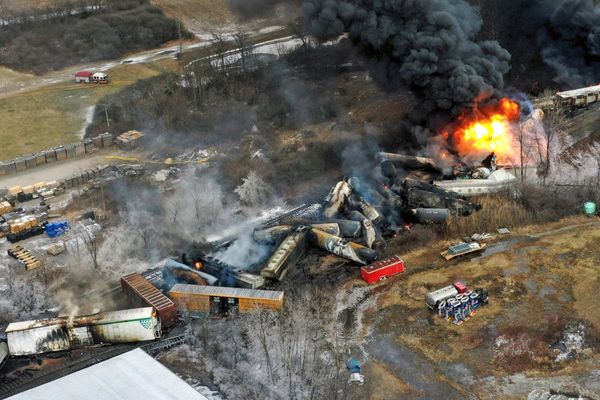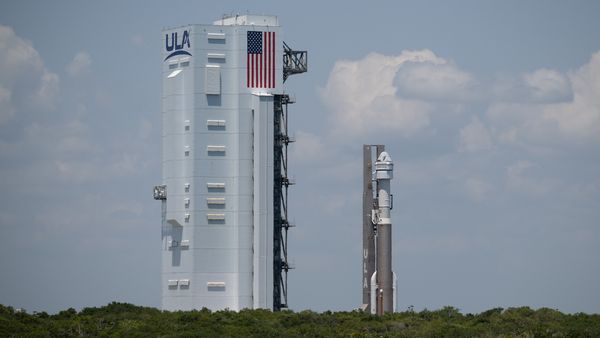
Photograph: Sarah Hodges/DFAT
The Australian journalist Cheng Lei – jailed for three years in China on ill-defined allegations of sharing Chinese state secrets overseas – has been freed and reunited with her family in Australia.
“Tight hugs, teary screams, holding my kids in the spring sunshine,” Cheng said via X (formerly Twitter) on Wednesday evening. “Trees shimmy from the breeze. I can see the entirety of the sky now! Thank you Aussies.”
The prime minister, Anthony Albanese,first announced she had been returned to Australia on Wednesday afternoon.
“When I spoke to Cheng Lei I welcomed her home on behalf of all Australians,” Albanese said, describing her as a strong and resilient person.
Albanese was opaque about the details or conditions of Cheng’s release.
“Her release follows the completion of judicial processes in China,” he said.
In a later interview with ABC radio, Albanese was asked whether Cheng was pardoned. “No, it was completed with time served in detention being taken into account,” he replied.
On Wednesday afternoon China’s national security body released a statement saying Cheng had been deported “in accordance with the law after serving her sentence”. It also provided some further details of the allegations against her, including revealing that her sentence was two years and 11 months in prison, and deportation.
“In May 2020, Cheng Lei was coaxed by personnel from an overseas agency, violated the confidentiality clause signed with the employing unit, and illegally provided the state secrets she mastered at work to the overseas agency through her mobile phone,” it said.
Cheng’s supporters have maintained she is innocent, and Canberra had said the case lacked transparency and judicial fairness. Her trial was held in secret and no evidence against her has been publicly released or examined. China’s opaque judicial system has a conviction rate of more than 99.8%, and there is almost no transparency in national security cases.
The former business anchor for the state-owned China Global Television Network (CGTN) was detained by security services in August 2020, and held, initially, in “residential surveillance at a designated location” (RSDL) – China’s secretive detention network in which a person can be held without charge for up to six months, and denied access to lawyers, consular services and family.
RSDL has been characterised by UN experts as a form of enforced disappearance with risks of torture.
Cheng was not formally charged until February 2021, when authorities said she was suspected of “illegally supplying state secrets overseas”. Her trial was held in secret more than a year later, and a verdict repeatedly delayed.
In June, marking three years in detention, Cheng wrote a “love letter” to Australia saying she longed for sunlight, the outdoors and her family.
“I miss the sun. In my cell, the sunlight shines through the window, but I can stand in it for only 10 hours a year.
“Most of all I miss my children,” Cheng said.
Another Australian detained on national security charges, the democracy activist and blogger Dr Yang Hengjun has not been released. Yang, a former Chinese state official but an Australian citizen since 2002, was detained in Guangzhou in 2019, charged in August of that year with espionage, and tried in May 2021. He has still not received a verdict.
Yang has been detained in a 1.2-metre-wide cell in Beijing with two other prisoners for four years, and his health is failing, suffering, in particular, from an acute kidney condition.
“If something happens with my health and I die in here, people outside won’t know the truth. That is frustrating,” he said in a recent message from detention.
Yang’s PhD supervisor in Australia, Prof Chongyi Feng, said: “The release of Cheng Lei clearly shows that there is no legal obstacle at all for the Chinese government to release Yang Hengjun.”
Albanese said the government would continue to advocate for Yang’s release.
The detention of Cheng and Yang came amid deteriorating China-Australia relations and an intensified crackdown on foreign media in China. Two Australian journalists based in China were also forced to leave the country after they were called in for interrogation by security services over Cheng’s case. In December 2020 a Chinese journalist for Bloomberg and friend of Cheng, Haze Fan, was also arrested on national security charges. She was released on bail in early 2022.
Australia’s prime minister said on Wednesday “good constructive meetings” with Chinese leaders had led to Cheng’s release.
“Dialogue is always a good idea, even with people who you have disagreements with.”
Albanese met the Chinese premier, Li Qiang, in Jakarta last month and urged him to understand that Australians “want to see Cheng Lei reunited with her children”.
Cheng’s release comes just weeks before Albanese is due to travel to China for talks with the president, Xi Jinping.
Annelise Nielsen, a friend and former colleague of Cheng’s, said her release was “just the absolute best-case scenario we could have hoped for”.
Nielsen, who is now Sky News Australia’s Washington correspondent, reported that Cheng flew back to Australia on a commercial flight accompanied by the Australian ambassador, Graham Fletcher.
Nielsen gave credit to Wong. “She picked this up and ran with it from the first day she came into office and we’ve been so grateful for that,” Nielsen said.
The opposition leader, Peter Dutton, welcomed Cheng’s release.
He urged the Albanese government to “use all available diplomatic means to equally secure” Yang’s return to Australia.
The Chinese ambassador, Xiao Qian, previously expressed his personal sympathy for Cheng multiple times over the past 12 months, which had raised hopes that a resolution might soon be brokered.
Additional reporting by Chi Hui Lin







